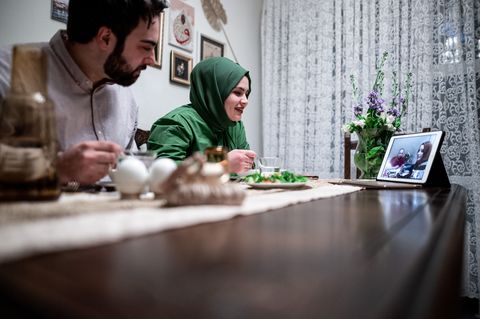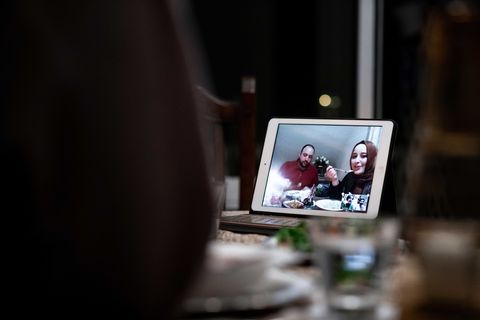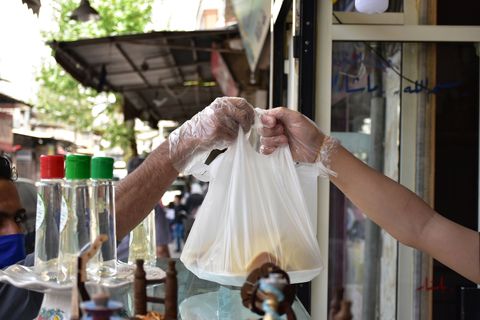The month of Ramadan is a time for social connection and celebration. It’s a time for religious reflection and volunteering, a time when we fast from food and water, as well as vices like anger, from sunup to sundown. I’ve celebrated in places as different as California, Jordan, and Washington DC. But no matter where I spend the month, that feeling of community that Ramadan fosters has always found me, and it’s this solidarity that I look forward to most in the days preceding the holiday.
When I celebrated in Jordan, I spent the month bouncing from huge iftar dinners, to dessert places, to hookah lounges, and then out for breakfast, finally falling into bed around 5 a.m. In DC, Palestinian colleagues I had just met invited me to their home and cooked dinners where we discussed Islam in America and the Syrian refugee crisis. The last two Ramadans, I had even started to become a pro at hosting iftar dinners, including my Muslim and non-Muslim friends, and spent time volunteering.
But this year, with the COVID-19 pandemic raging, Ramadan will be different. It’s uniquely challenging to practice social distance when congregated for prayer at a mosque. Restaurants remain closed for the safety of staff and patrons. In some states, stay-at-home orders require people to remain isolated in their houses except for essential business. All of the quintessential parts that define the community aspect of Ramadan—large extended prayer services, convivial family gatherings, communal meals—are banned, dangerous, or highly discouraged. Needless to say, Ramadan is going to look vastly different this year.
Abdullah Mohammed lives in the Bay Area of California and frequents the Bay Area Muslim Community Association (MCA) during Ramadan. Though he feels fortunate to have family to celebrate with at home, he said he’ll miss the “sense of community and togetherness” that the month traditionally fosters for him. He often eats suhoor—a morning meal before the sun rises—with friends at IHOP or Denny’s in the morning before beginning their fasts; this year, that won’t be an option.
Because Ramadan is a time of community and inclusivity, many Muslims without a favorite mosque or established community use it as an opportunity to break into new circles. Nadia Khansa, who’s moved around a lot, was hoping to do just that after recently landing in Washington, DC. But now, because of the pandemic, she’s found the month more isolating. “I’m fairly introverted and bad at putting myself out there, but I usually use Ramadan as a safe time where I know mosque doors are extra wide open, to start making those connections with my community and trying different mosques to see which one I fit in with,” she told ELLE.com.
Many mosques and Muslim organizations are finding creative ways to organize events even in quarantine. At Center DC, a faith-based community group serving the DC area, Ramadan is typically about communing over shared meals.
But the center swiftly adapted after the quarantine began, starting with taking all their programming to Zoom early last month. During Ramadan, the center will host digital Iftar Leagues, where people can “break fast in virtual community,” Shreiber said. “We also added a daily morning session for right after fajr so that people can make the most of the time between prayers and going back to sleep in the morning to read Quran and make supplication to God together.” They’ve partnered with Masjid Muhammad in DC to set up a mutual aid effort to match young professionals (Center DC’s main demographic) with their senior members. Though the center is based in DC and will be following prayer times in that region, the virtual programming will be open to everyone.
At the Ahmadiyya Muslim Community in Richmond, VA, Ramadan is usually programmed with Quran classes before breaking the fast, its young people gathering for a suhoor meal at IHOP, open house community dinners, and an annual fair at the mosque. This year, Vice President Salaam Bhatti said everything is digital, with Quran classes after fajr on Youtube and daytime classes via Zoom. And while the mosque can’t open its doors to the community this year, he said they still hope to foster “greater friendships and understanding,” by staying open for essential services and opening up their doors to food or blood drives if the need arises. “While we must be physically distant,” Bhatti said, “We do not need to be spiritually or emotionally distant from one another.”
Many Muslims are looking for opportunities to contribute to their community without the usual in-person volunteer opportunities provided by many mosques and community centers. Masjid al-Rabia, a radically inclusive mosque in Chicago, is organizing a Radical Muslim Mutual Aid Fund structured around the models set by “the COVID-19 Mutual Aid Fund for LGBTQI+ BIPOC Folks, the Believers Bail Out and the Seattle Artists Relief Fund,” according to their website. Mutual aid is community care through which community members care for one another without a top-down approach. It’s not charity, but rather a mutually beneficial act of solidarity between individuals and their communities. The ethos of mutual aid in the form of wealth redistribution is an integral part of Islam (as zakat), so this is a wonderful way in which Muslims can get involved in supporting their community while continuing to protect themselves and others from COVID-19.
This year, Ramadan is beginning as I myself enter my seventh week of social distancing to flatten the COVID-19 curve. Though I welcome the opportunity for personal growth and pious observation, I feel a profound loss in being without my community this year. Still, I plan to have evenings where I cook the same meal with friends via FaceTime, staying on video to eat together when the sun sets. I’ll join Zoom meetings where speakers talk about the Quran, as I try to finish reading the whole thing day by day. And most importantly, I’ll volunteer my time and money virtually to provide relief for those so deeply affected by the COVID-19 crisis. But it won’t be exactly the same.




